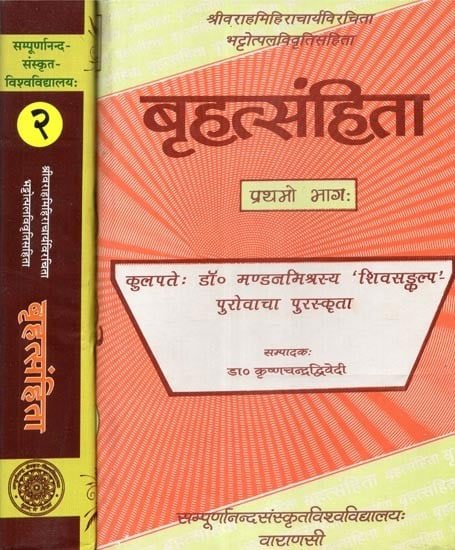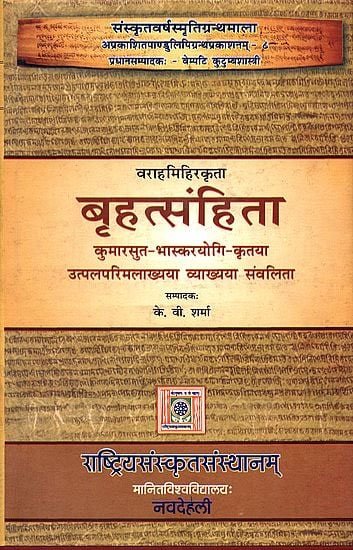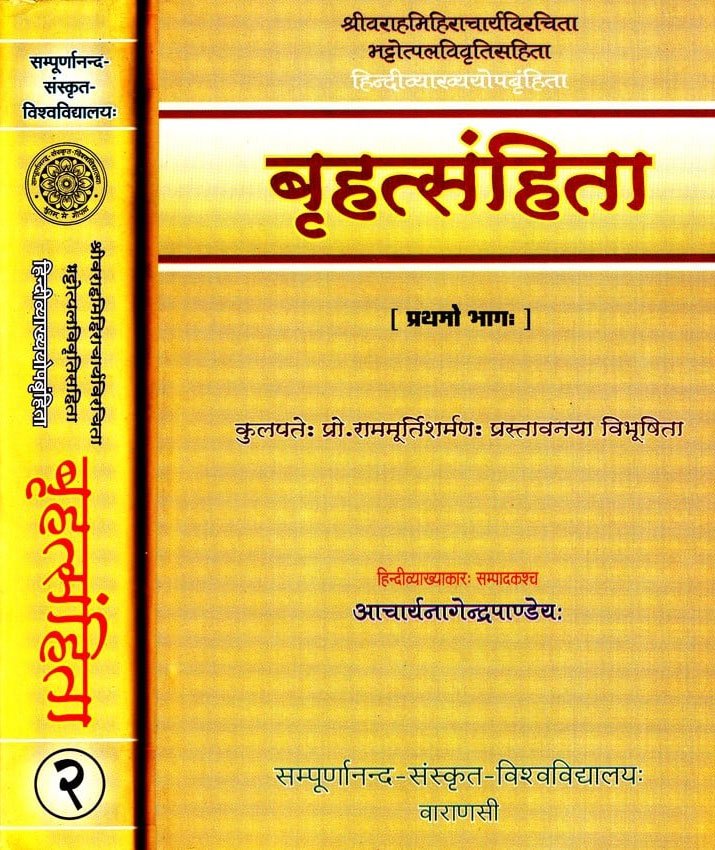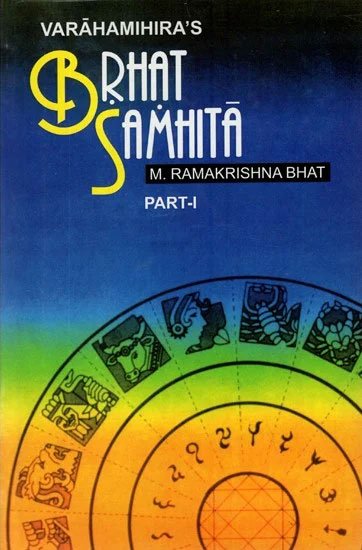Brihat-samhita [sanskrit]
26,560 words
The Sanskrit text of the Brihat-samhita from the 6th-century authored by Varaha Mihira in present-day Ujjain, India. It primarily deals with astrology and astronomy but is presented as an encyclopedia of knowledge.
Verse 15.6
पुष्ये यवगोधूमाः शालीक्षुवनानि मन्त्रिणो भूपाः ।
सलिलोपजीविनः साधवश्च यज्ञेष्टिसक्ताश्च ॥ ६ ॥
puṣye yavagodhūmāḥ śālīkṣuvanāni mantriṇo bhūpāḥ |
salilopajīvinaḥ sādhavaśca yajñeṣṭisaktāśca || 6 ||
The Sanskrit text of Verse 15.6 is contained in the book Brihata Samhita (Sanskrit Text with Hindi Translation) by Pandit Achyutananda Jha. This book is available online or you could buy the latest edition:
Read online Buy now! The Sanskrit text by Pandit Achyutananda Jha (2001)
Glossary of Sanskrit terms
Note: This extracts Sanskrit terms and links to English definitions from the glossary, based on an experimental segmentation of verse (15.6). Some terms could be superfluous while some might not be mentioned. Click on the word to show English definitions.
Pushya, Yava, Godhuma, Shali, Shalin, Kshuvat, Mantrin, Mantri, Bhupa, Salilopajivin, Sadhu, Yajna, Ishtin, Ishti, Sakta,
Analysis of Sanskrit grammar
Note: this is an experimental feature and only shows the first possible analysis of the Sanskrit text (Verse 15.6). If the system was successful in segmenting the sentence, you will see of which words it is made up of, generally consisting of Nouns, Pronouns, Verbs, Participles and Indeclinables. Click on the link to show all possible derivations of the word.
- Line 1: “puṣye yavagodhūmāḥ śālīkṣuvanāni mantriṇo bhūpāḥ ”
- puṣye -
-
puṣya (noun, masculine)[locative single]puṣya (noun, neuter)[nominative dual], [vocative dual], [accusative dual], [locative single]puṣyā (noun, feminine)[nominative dual], [vocative single], [vocative dual], [accusative dual]√pus -> puṣya (participle, masculine)[locative single from √pus class 10 verb]√pus -> puṣya (participle, neuter)[nominative dual from √pus class 10 verb], [vocative dual from √pus class 10 verb], [accusative dual from √pus class 10 verb], [locative single from √pus class 10 verb]√pus -> puṣyā (participle, feminine)[nominative dual from √pus class 10 verb], [vocative single from √pus class 10 verb], [vocative dual from √pus class 10 verb], [accusative dual from √pus class 10 verb]√puṣ (verb class 1)[present passive first single]√puṣ (verb class 4)[present middle first single], [present passive first single]√puṣ (verb class 9)[present passive first single]√puṣ (verb class 4)[present middle first single], [present passive first single]
- yava -
-
yava (noun, masculine)[compound], [vocative single]yava (noun, neuter)[compound], [vocative single]yavan (noun, masculine)[compound]
- godhūmāḥ -
-
godhūma (noun, masculine)[nominative plural], [vocative plural]
- śālī -
-
śālī (noun, feminine)[compound], [nominative single]śāli (noun, masculine)[nominative dual], [vocative dual], [accusative dual]śālin (noun, masculine)[nominative single]
- kṣuvan -
-
kṣuvat (noun, masculine)[vocative single]√kṣu -> kṣuvat (participle, masculine)[nominative single from √kṣu class 2 verb], [vocative single from √kṣu class 2 verb]
- āni -
-
- mantriṇo* -
-
mantrin (noun, masculine)[nominative plural], [vocative plural], [accusative plural], [ablative single], [genitive single]mantrin (noun, neuter)[ablative single], [genitive single]mantrī (noun, neuter)[ablative single], [genitive single]
- bhūpāḥ -
-
bhūpa (noun, masculine)[nominative plural], [vocative plural]
- Line 2: “salilopajīvinaḥ sādhavaśca yajñeṣṭisaktāśca ”
- salilopajīvinaḥ -
-
salilopajīvin (noun, masculine)[nominative plural], [vocative plural], [accusative plural], [ablative single], [genitive single]salilopajīvin (noun, neuter)[ablative single], [genitive single]
- sādhavaś -
-
sādhu (noun, masculine)[nominative plural], [vocative plural]
- ca -
-
ca (indeclinable conjunction)[indeclinable conjunction]ca (noun, masculine)[compound], [vocative single]ca (noun, neuter)[compound], [vocative single]
- yajñe -
-
yajña (noun, masculine)[compound], [vocative single], [locative single]
- iṣṭi -
-
iṣṭi (noun, feminine)[compound], [adverb]iṣṭin (noun, masculine)[compound], [adverb]iṣṭin (noun, neuter)[compound], [adverb], [nominative single], [vocative single], [accusative single]iṣṭī (noun, masculine)[adverb], [vocative single]iṣṭī (noun, feminine)[compound], [adverb], [vocative single]iṣṭī (noun, neuter)[compound], [adverb], [nominative single], [vocative single], [accusative single]
- saktāś -
-
sakta (noun, masculine)[nominative plural], [vocative plural]saktā (noun, feminine)[nominative plural], [vocative plural], [accusative plural]√sag -> sakta (participle, masculine)[nominative plural from √sag class 1 verb], [vocative plural from √sag class 1 verb]√sag -> saktā (participle, feminine)[nominative plural from √sag class 1 verb], [vocative plural from √sag class 1 verb], [accusative plural from √sag class 1 verb]√saj -> sakta (participle, masculine)[nominative plural from √saj class 1 verb], [vocative plural from √saj class 1 verb]√saj -> saktā (participle, feminine)[nominative plural from √saj class 1 verb], [vocative plural from √saj class 1 verb], [accusative plural from √saj class 1 verb]√sañj -> sakta (participle, masculine)[nominative plural from √sañj class 1 verb], [vocative plural from √sañj class 1 verb]√sañj -> saktā (participle, feminine)[nominative plural from √sañj class 1 verb], [vocative plural from √sañj class 1 verb], [accusative plural from √sañj class 1 verb]
- ca -
-
ca (indeclinable conjunction)[indeclinable conjunction]ca (noun, masculine)[compound], [vocative single]ca (noun, neuter)[compound], [vocative single]
Other editions:
Also see the following editions of the Sanskrit text or (alternative) English translations of the Verse 15.6
Brhatsamhita with the Commentary of Bhattotpala
by Krishna Chandra Dwivedi (2016)
Publisher: Sampurnanand Sanskrit University; 1229 pages;
Buy now!
Brihat Samhita with the Commentary of Utpalapatimala of Yogisvara
by K. V. Sharma (2012)
Publisher: Rashtriya Sanskrit Sansthan, Janakpuri; 754 pages; ISBN-10; 8186111360; ISBN-13: 9788186111369
Buy now!
Brihat Samhita (Hindi Translation)
by K. V. Sharma (2002)
Publisher: Sampurnanand Sanskrit University; 2359 pages; ISBN-13: 9789387890008.
Buy now!
Brhat Samhita (English translation)
by N. Chidambaram Iyer (2022)
Publisher: Parimal Publication Pvt. Ltd.; 801 pages; Edited by Dr. Shrikrishna Jugnu; ISBN-10: 8171104215; ISBN-13: 9788171104215.
Buy now!
Brhat Samhita (English with notes)
by M. Ramakrishna Bhat (2010)
Publisher: Motilal Banarsidas Publishers Pvt. Ltd.; 1155 pages; ISBN-10: 8120810600; ISBN-13: 9788120810600.
Buy now!
Brhat Samhita (Telugu translation)
by Sishtla Umamaheswara Sharma (2020)
Publisher: Mohan Publications, Andhra Pradesh; 846 pages.
Buy now!Preview of verse 15.6 in Kannada sript:
ಪುಷ್ಯೇ ಯವಗೋಧೂಮಾಃ ಶಾಲೀಕ್ಷುವನಾನಿ ಮನ್ತ್ರಿಣೋ ಭೂಪಾಃ ।
ಸಲಿಲೋಪಜೀವಿನಃ ಸಾಧವಶ್ಚ ಯಜ್ಞೇಷ್ಟಿಸಕ್ತಾಶ್ಚ ॥ ೬ ॥
Brhat Samhita (Gujarati translation)
by - (2000)
Publisher: Shree Harihar Pustakalay, Surat; Author: Shri Varahamihira Acharya (શ્રી વરાહમિહીરાચાર્ય); 432 pages.
Buy now!Preview of verse 15.6 in Gujarati sript:
પુષ્યે યવગોધૂમાઃ શાલીક્ષુવનાનિ મન્ત્રિણો ભૂપાઃ ।
સલિલોપજીવિનઃ સાધવશ્ચ યજ્ઞેષ્ટિસક્તાશ્ચ ॥ ૬ ॥
Brhat Samhita (Kannada translation)
by Sripada Raghunatha Kulkarni (2021)
Publisher: Srinidhi Publications, Bangalore; 668 pages with illustrations.
Buy now!Preview of verse 15.6 in Kannada sript:
ಪುಷ್ಯೇ ಯವಗೋಧೂಮಾಃ ಶಾಲೀಕ್ಷುವನಾನಿ ಮನ್ತ್ರಿಣೋ ಭೂಪಾಃ ।
ಸಲಿಲೋಪಜೀವಿನಃ ಸಾಧವಶ್ಚ ಯಜ್ಞೇಷ್ಟಿಸಕ್ತಾಶ್ಚ ॥ ೬ ॥
![Brihat-samhita [sanskrit] - book cover](/uploads/a/Brihat-Samhita-Sanskrit.jpg)







